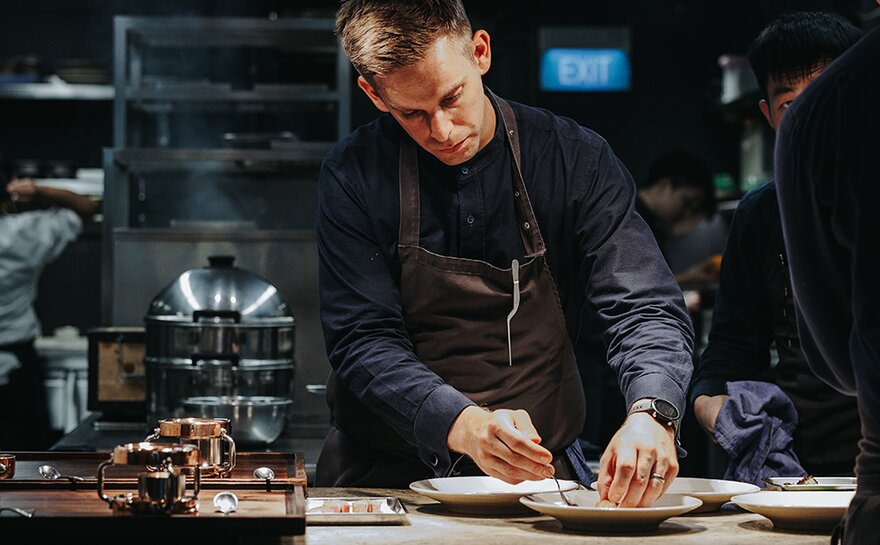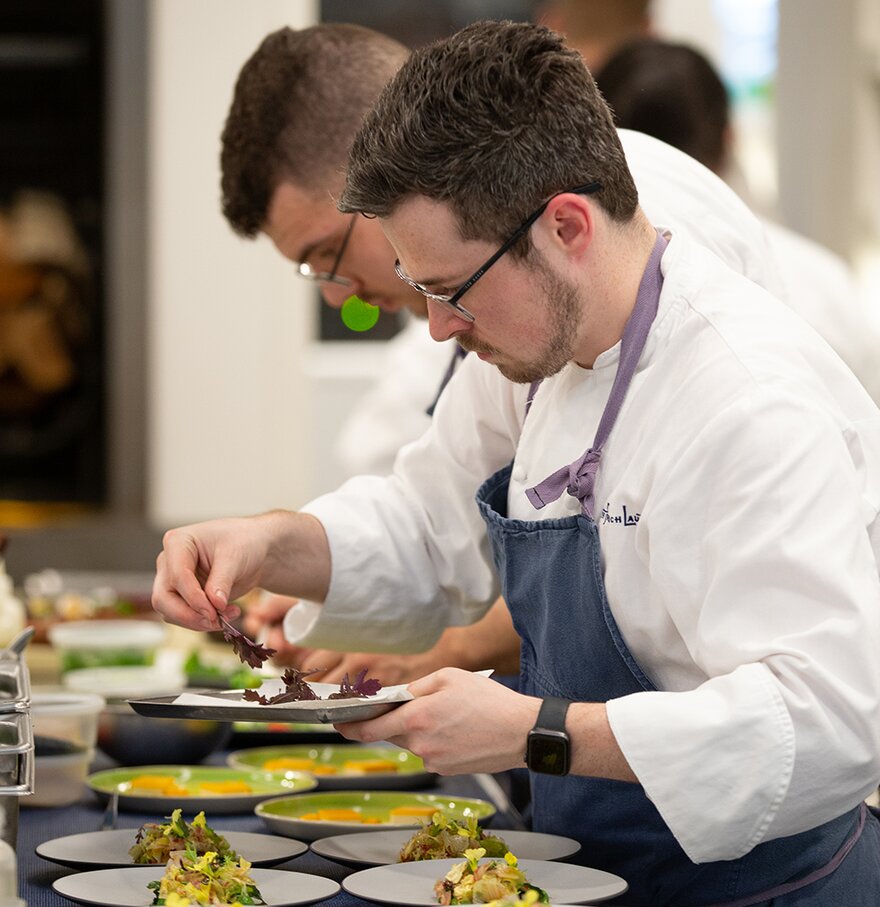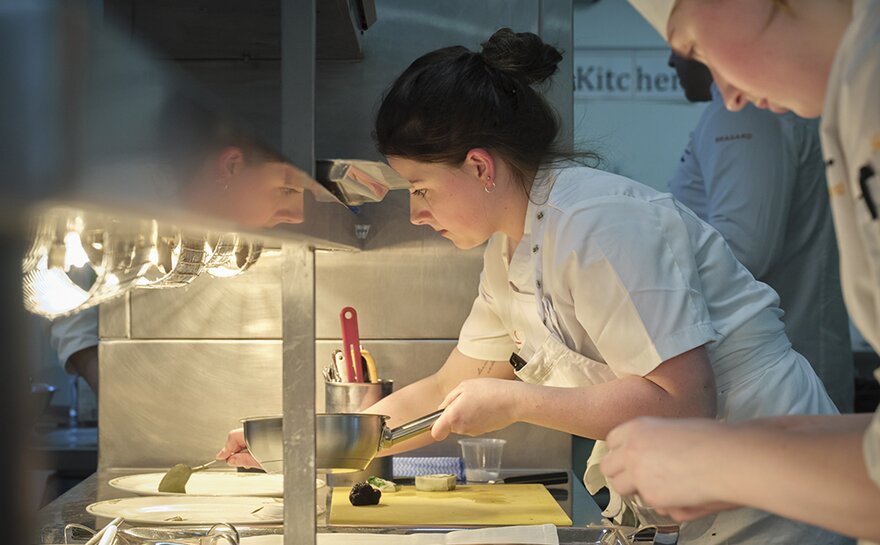After years of Covid-related turmoil, the three most recent Roux Scholarship winners have finally been able to enjoy their prizes. Oli Williamson, Jonnie Ferguson and April Partridge tell their experiences
Oli Williamson
Oli Williamson won the 2020/21 Roux Scholarship competition at the first time of asking. With the competition final postponed to 2021 because of the pandemic, he finally completed a two-month stage at three-Michelin-starred Zén in Singapore in March 2023. Promoted to head chef at the Fat Duck in Bray, Berkshire, during the course of the competition, Williamson left the restaurant in March this year to relocate to France.
Of all the three-Michelin-star restaurants in the world, why did you choose Zén?
It was the one my heart was set on from the start. I'd been to Frantzén [Zén's mother restaurant, in Stockholm, Sweden] for a few days, and was really intrigued by the food there. But I wanted to be exposed to new products, different techniques, go somewhere I've never been. I've been lucky enough to travel and to live and work in Sydney and San Francisco. This gave me a chance to go to a new continent and be exposed to a new culture and cuisine.
What were your expectations?
I went in very open-minded. I'm not an egotistical guy; I'd describe myself as quite humble. So even going from the head chef of one three-star, the Fat Duck, to another one, Zén, as a stagiaire, I just wanted to be humble.
What were your first impressions?
I was very nervous going in. You become used to being in control of situations and knowing what to expect of a day. But going across to the other side of the world – I guess it's a bold move. We're fortunate to have accommodation and a wage, but you're still not in control of what's going to happen when you first go in there.
What was your first role at the restaurant?
I was on prep for two weeks. They have a prep kitchen with an AM team and a PM team, and a separate service team. I did 10am till 10pm, so I spent time with both AM and PM teams.
How did the three months play out?
After spending two weeks in prep, I went to the kitchen and did two weeks in the garde manger, which is where the snack section is. There's four or five people in there doing five snacks, so there's a lot of work that goes into them. And then I moved onto the pass for a couple of weeks – although with someone senior there expediting, so it's not like you're in the wilderness. I was also involved in the test kitchen. In the afternoons between services they develop new dishes, and I could see how they progress them to be menu-worthy.
What was your biggest challenge?
The chefs serve a lot of the food. I did a couple of days in front of house and was totally out of my comfort zone. The pass is my safety blanket, and talking to guests was really, really tricky. After the first day I was almost sick. And then the second day, I really enjoyed it. I got a bit of a feel for what to do and I relaxed, and then everything became much easier. They have a certain way of doing things, which I'm not used to. It's not like French formal, but it's still formal. It's a modern, open-hand style of service. It looks very relaxed, but actually, if you're doing it with other people, you're all in sync.
What specific new skill or skills did you learn?
A lot of fish techniques. I know it's quite trendy, but kissing stuff with charcoal, they do that a lot – it's the Japanese aburi method. I also learned the yubiki method, which is blanching fish in boiling water. They also had this way of ageing melons, where they'd turn them every day. To pick the juiciest ones with the most flavour without cutting them, they'd tap them, so that was really interesting as well.
What did you do when you weren't working?
I went to a lot of the local hawker stalls. Dining out in Singapore is a melting pot. They have real Chinese food, real Thai food, real Pakistani food – all amazing cuisines. Being exposed to those techniques and flavours has opened my mind and really helped menu planning.
What's next for you?
I left the Fat Duck in March and I'm moving to Bordeaux with my wife. My visa is in process and I should be over there at the start of September. I've sent out some CVs, but not being able to speak the language doesn't help that much. We want to settle down and buy somewhere. It's a good location for my wife's family. It's also got good links to Paris and London, so if I do open a restaurant, hopefully it will be busy!
Jonnie Ferguson
The 2022 winner Jonnie Ferguson triumphed in his third attempt at the competition – he'd also entered in 2019 and 2020 – and chose to complete a stage at the three-Michelin-starred French Laundry in California. Ferguson is currently junior sous chef at the Glenturret Lalique Restaurant in Crieff, Scotland.
Of all the three-Michelin-star restaurants, why did you choose the French Laundry?
I wanted to take advantage of going somewhere that excited me, and it has been high up on my list to eat at for a very long time. The more I looked into it and the more people I spoke to that I know who had worked there, the more I got to know about it and the systems they have in place, how they are with their staff, and how the business operates. I really wanted to tap into that.
What were your expectations?
I went into it thinking I'd have to do the usual stagiaire jobs for a week and maybe have a chance to then prove myself, show I'm a competent cook and hopefully get onto a section.
What was your first role at the restaurant?
I arrived in San Francisco at 10.30pm on the Tuesday, super jet-lagged, and started at 7am on the Wednesday. I was put onto AM shifts, with the commis chefs doing prep from 7am until about 5pm; the PM team then arrive at noon, do service, write the menu for the next day and then leave a list for the AM team to prep the following day.
How did the three months play out?
For the first three to four weeks I was with the AM team and it was a sort of induction. It was great because I got to go through a huge amount of recipes, see their repertoire and see how they utilise ingredients in different ways. And because the menu changes every day, you prep more or less 90% different things each day.
After that, they swapped me over to the PM team, to be part of the service team for the next six weeks. I started off on what we would call larder, doing cold plates, and then I kind of gradually moved into the kitchen. They gave me quite a lot of free rein after the first week or two because they realised that if they showed me how to do something I could do it competently to the level they expected.
For the final two weeks I switched back to the AM team as they had a butcher and fishmonger and I wanted to spend some time with them.
What was the most eye-opening aspect?
The level of trust. In the UK, people struggle to trust younger chefs – to give them recipes and say, "crack on". Over there, the way they structure all the recipes means anything that has ever been made has been documented. If a chef de cuisine comes up with an idea, they will ask a commis chef to make it with them. They'll go through the process of development and expect the commis to write notes. And at the end of it, the commis will pass over their notes, the chef will write up the recipe, and then it will be saved on a file with both chefs' names. With it, you'll have a picture of the dish, a list of equipment – right down to the size of the whisk, the size of the spatula – and then notes of where the recipe could go wrong and how to stop it from going wrong. Any chef in the kitchen could then pick it up and it would be so bulletproof that they could cook it.
What specific new skill or skills did you learn?
For me a lot of it was the big cover numbers and just moving a bit faster. Post-Covid I've worked in restaurants that have been fewer covers – in the mid 20s. To then go somewhere that's doing 100-plus is a big change. So that kind of got me moving faster – still doing a job to a high standard but just kicking it up a gear.
Now that you are back, how has the stage affected your menu planning?
As well as the recipes, I brought certain parts back with me. Not necessarily carbon copies of what they have done but adapting certain things to Scotland. Like their charcuterie. For example, they made a smoked wagyu sausage, and as soon as I got back I made a Highland wagyu and turned it into a sort of corn dog using barley byproduct from a distillery. So there are little things like that which serve as a nod to the three months I was away.
What's next for you?
I am really liking being back at Glenturret. It was nice to have that break and afterwards it kind of felt like coming back to a new job – a sense of a reset almost. I'm enjoying being back for now. And then I can see where it takes me.
April Partridge
For the first time in the competition's history, the 2023 winner had the choice of completing a series of training courses of their choice instead of a three-month stage. April Partridge, who is currently sous chef at the Ledbury in London's Kensington, is planning a series of short training courses in Australia, the USA, Britain and France as her prize.
Why did you choose the training courses?
As soon as I won the competition I knew that I wanted to go for the training courses. As an option it is much more flexible. It can fit around my work and life; I don't have to take a big chunk of time off. Plus, I have two pets and live on my own, so the courses work better in terms of looking after them.
Where are you going?
In November I'm going to Australia for 10 days to learn about fish butchery with Josh Niland at Saint Peter. Then I'm doing a day each at Quay Restaurant, Bennelong and Firedoor [all in Sydney]. I'm going to Cornwall this week to visit the guys at Flying Fish Seafoods, as well as Philip Warren Butchers and St Ewe Eggs. After that, I plan to spend two weeks in the USA, hopefully at Tartine Bakery in San Francisco, and with chef Ian Scaramuzza [the 2015 Roux Scholar, who is now at Mélisse restaurant in Santa Monica]. Then hopefully I'm going to do a chocolate course in Paris, a charcuterie course, a cheese course and a beekeeping course.
Why did you opt for those places rather than a stage at a three-Michelin-starred restaurant?
I'm very produce-driven as a chef and I'm passionate about learning where food comes from and sharing that with people. I want to use the courses to fill gaps in my skillset. Fish butchery isn't something I've done a huge amount of, so I'm hoping to learn as much as I can when I'm with Josh. I love bread, so it's incredibly exciting to visit my favourite bakery in the world. With Ian, the way he works is very precise and that's maybe what I lack a bit, so I want to spend some time learning from him. This is the first year the scholarship has done this, I think it's really exciting both for them and me.
Continue reading
You need to create an account to read this article. It's free and only requires a few basic details.
Already subscribed? Log In












